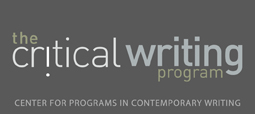Cinema Studies
An Overview of the Discipline
The discipline of Cinema Studies involves the critical study of film history, theory, and aesthetics. Engagement primarily focuses on the critical study of national cinemas, international film movements, major and minor filmmakers in various traditions, the economic, legal and political forces governing film industry practice, film and media theory, and the relationship between film and the other arts. Cinema Studies is increasingly growing to include media studies, encompassing film, television, and internet.
Writing in the Discipline
Reasoning
Writing in the discipline is largely explanatory; writing pieces generally focus on personal interpretation of films, film theories, and social implications. Due to the subjective nature of the writing, persuasive elements are sometimes incorporated, but the main arguments tend to remain explanatory, specifically when the writing utilizes historical evidence.
Evidence
Evidence usually takes the form of images and sequences, sociological analyses, statistical data such as audience ratings and box office figures, and historical texts. Evidence can vary depending upon the nature of the writing piece; humanistic and theoretical pieces will focus more on images and analyses, while political and historical pieces will focus more on statistics and historical proof.
Authorship
Individual scholarship is more common in the field, as writers develop and expand upon their own interpretations. However, colloquial conversations between scholars takes place. Individual points of view exist in a larger academic dialogue, so works of writing are often shared and critiqued by others in the field. In some cases, hybrid research projects and co-authorships can occur.
Goal
The principal goals of writing in the discipline of Cinema Studies include affirmation of a position and expression of a personal interpretation, particularly in the case of reviews, critiques, and analyses. In some cases, however, the goal of writing can be to define and propose a solution to a problem seen within the field.
Writing Tips
Top Criteria
Criteria for writing within the discipline vary depending upon scholar and professor. For the most part, original ideas, reasoning, and evidence are regarded as the most important criteria. Grammar and mechanics have large impacts on the piece, but do not matter as much as the actual ideas and proof presented in the work.
Common Errors
The most common errors made by students are plagiarism (both deliberate and unintentional), inability to define a precise argument (or lack of confidence in argument), and failure to revise during the writing process. In addition, many students have a difficult time grasping and explaining concrete arguments that develop from abstract concepts.
Writing Process
The writing process includes research/reading within the field, development of a topic, research of a given topic, development of an argument, planning of an outline, drafts, peer reviews, revisions, and more drafts. The revision and draft process may repeat until the writer is confident in the final product.
Genre
Student Writers
Student writing typically includes reviews, response papers, research papers, visual analyses, oral presentations, and critical essays. Student writing directly relates to the discipline, as students have a vast array of topics to choose from but must still narrow down on a central, concise argument. Assignments vary from class to class but generally involve thorough research of some kind.
Professional Writers
Professional writers within the field will write books, articles, reviews, interviews, and analyses. For the most part, professional writing stems from a topic about which the author feels strongly and wishes to explain to an audience. The writing process for professionals within the discipline often includes peer review and feedback, as the nature of the genre lends itself to critiques and dialogues within the discourse community.
Additional Resources
Helpful Books and Articles
Little Brown HandbookA Short Guide to Writing about Film
© 2013 The University of Pennsylvania
Meet the Professors

Timothy Corrigan
Timothy Corrigan is a professor of English and Cinema Studies at the University of Pennsylvania. His work has focused mainly on modern American cinema and contemporary international film. He regards Andre Bazin as the greatest writer within his field.

Karen Beckman
Karen Beckman is a professor of Cinema and Modern Media in the department of the History of Art. Her work primarily focuses on the humanistic realm of film; politics, culture, theories, and visual analyses. She regards Miriam Hansen and Tom Gunning as the best writers within the field.
